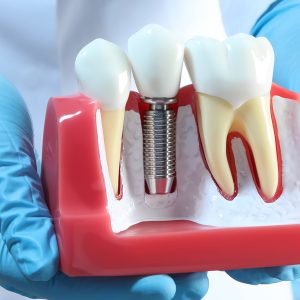Thinking About Dental Implants in Paoli, PA? Read This First!

If you’re thinking about dental implants in Paoli, PA, you probably want a reliable solution that restores both comfort and confidence. This guide walks you through everything you should know before deciding, how implants work, who qualifies, what recovery feels like, and how to keep them lasting for years, so your next smile choice is fully informed.
Understanding Dental Implants
Made from medical-grade titanium, a dental implant is gently inserted into the jaw to replace a lost tooth root and gradually merge with the surrounding bone for long-term support. Once healed, a custom crown, bridge, or denture is attached for chewing comfort and appearance. Unlike removable options, an implant becomes part of your jaw, preserving bone and maintaining your facial shape over time.
Key benefits include:
- Natural appearance and feel when you speak or chew
- Long-term durability with proper care
- Bone preservation to prevent jaw shrinkage
- Independent support, no alteration of nearby teeth
Each implant is carefully planned with digital imaging to ensure the angle, depth, and placement support both function and aesthetics.
Are You a Candidate for Implants?
Most healthy adults qualify, but a few factors determine success. Your dentist will evaluate your gum health, bone volume, and medical history. Certain medications, conditions, or smoking habits can influence healing time.
If you’ve been searching for a dentist near me to replace missing teeth, your initial consultation should include 3D scans and a thorough health review. Even if bone loss has occurred, many people still qualify through bone grafting or sinus lift procedures designed to rebuild support for the implant.
What the Process Looks Like
Every smile is different, but most treatment plans include the following stages:
- Consultation and Planning – Detailed imaging, impressions, and discussion of options.
- Preparation – If necessary, old teeth are removed, or bone is grafted.
- Implant Placement – The implant post is placed precisely under local anesthesia.
- Healing Phase – Over the next few months, the bone integrates naturally with the implant.
- Abutment and Crown Placement – A connector (abutment) and crown restore your full function and appearance.
The full process may span several months, but each stage contributes to strength, longevity, and comfort. Some cases qualify for same-day restorations when bone conditions allow.
How Comfortable Is the Procedure?
Thanks to modern techniques and local anesthesia, the experience is typically easy to tolerate. Most patients describe mild soreness rather than sharp pain after placement. Recovery usually includes a soft-food diet for a few days and minor swelling that subsides quickly. Over-the-counter pain relief and careful oral hygiene help you stay comfortable during the early healing phase.
Healing and Recovery
After placement, osseointegration, the bonding of bone and implant, takes several weeks to months. During this time, your dentist will check progress and ensure the surrounding tissue stays healthy. You’ll receive guidance on brushing techniques, temporary diet restrictions, and follow-up visits to track bone response.
The goal is a fully stable base that feels indistinguishable from your natural teeth once the final crown is attached.
Cost and Coverage Factors
Pricing for implants varies depending on your needs and the materials involved. Consider the following factors:
- Number of teeth being replaced
- Whether bone grafting or extraction is needed
- Type of restoration (single crown, bridge, or implant-retained denture)
- Lab customization and digital imaging technology
- Post-surgery visits and maintenance appointments
While insurance rarely covers the full procedure, some plans assist with specific portions like crowns or extractions. When comparing estimates from a Paoli dentist, be sure each quote includes every stage, planning, surgery, and restoration, so you understand the full investment.
Implant Alternatives
Dental implants aren’t the only option, though they are often the most stable. Depending on your situation, your dentist may recommend:
- Fixed Bridge: Ideal for small gaps; uses adjacent teeth for support.
- Removable Partial Denture: A cost-effective solution that can be adjusted easily.
- Full Denture: May later be upgraded with implants for a better fit and comfort.
Your dentist’s advice is based on bone condition, budget, and lifestyle preferences. Many people choose implants for their permanence, while others start with transitional solutions until they’re ready.
Aftercare and Long-Term Maintenance
Dental implants require the same consistent brushing, flossing, and checkups that keep natural teeth healthy. Good hygiene habits and regular checkups keep gums healthy and prevent complications.
Daily care tips:
- Make it a habit to brush morning and night using a soft brush.
- Use non-abrasive toothpaste to protect surfaces.
- Clean around implants with floss or interdental brushes
- Consider a water flosser for easier access
- Visit your hygienist every six months
If you clench or grind, wearing a nightguard prevents extra stress on your implant. Notify your dentist if you ever feel looseness or gum irritation near the implant area so it can be addressed early.
Frequently Asked Questions
Q. How long do implants last?
With consistent care, implants can last decades. Over time, the crown might need replacement due tom normal wear, but the titanium implant beneath it is built to last for many years.
Q. Can older adults get implants?
Yes. Age isn’t a barrier if you’re healthy and have adequate bone. Many older adults choose implants for improved chewing and comfort compared to dentures.
Q. Is the process safe?
When performed by an experienced provider, implant placement is a predictable and low-risk procedure. Careful planning and sterilization ensure a safe environment.
Q. How soon can I eat normally?
Soft foods are recommended for the first few days. Once your dentist confirms healing progress, you can gradually return to your usual diet.
Q. What if I’m nervous about surgery?
Discuss sedation options before your appointment in dental clinic in Paoli. Many patients choose gentle relaxation medication to feel at ease during the procedure.
Why Choose a Local Implant Provider
Choosing a nearby clinic means easier follow-ups and consistent care from the same team throughout your journey. When searching for dental implants near me, look for credentials, modern imaging, and transparent communication. A provider who handles planning, surgery, and restoration in one office simplifies the process and ensures a seamless experience from start to finish.
Final Thoughts
Dental implants restore more than missing teeth; they bring back function, comfort, and self-assurance. By maintaining good daily habits and seeing your dentist regularly, you can keep your implant restoration healthy and beautiful well into the future.
For personalized advice and step-by-step guidance, schedule a consultation with dentist of Paoli to discuss your goals, review imaging results, and design a treatment plan that fits your lifestyle perfectly.




